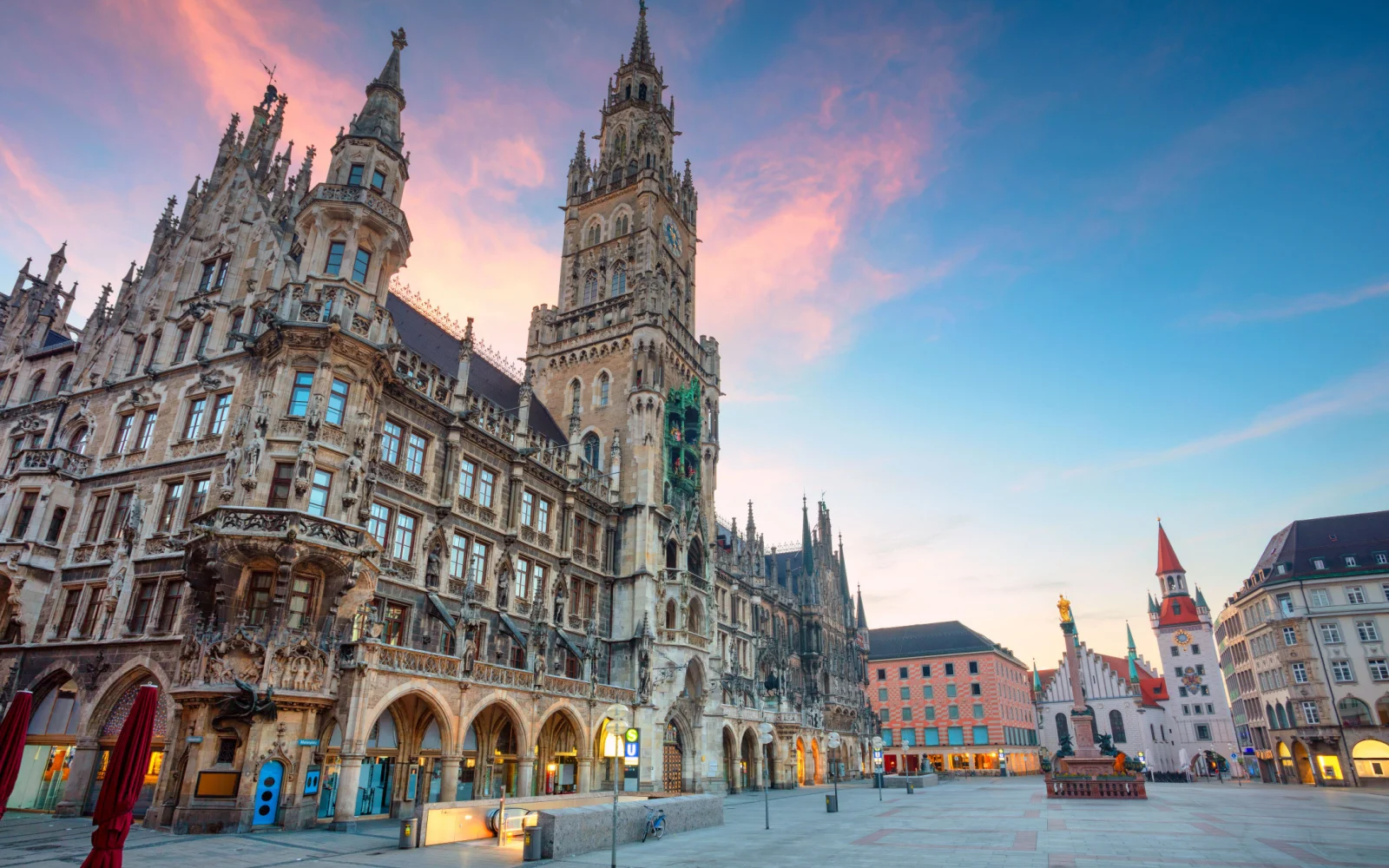Is Munich safe to visit in 2025?
The city of Munich is one of the most elegant cities in Germany and a popular tourist destination. Every year, it welcomes about 16 million visitors, which is about 10 times the full-time population.
Most tourists visit the city for the famous Oktoberfest, an annual beer festival where people wear dirndls, drink liters of beer, and enjoy the atmosphere of debauchery.
Even when Oktoberfest is not going on, Munich has plenty to see (although the atmosphere is much calmer and more sedate).
Explore the local landmarks such as the historic town square with an hourly glockenspiel performance from the Neues Rathaus, have a meal in one of the historic beer halls, or use Munich as a base to explore the glorious mountainous landscapes of Bavaria, the surrounding region.
It’s a wonderful city to explore, and you’ll certainly find plenty to do there. However, it is still a big city with over one million people, meaning it probably has many problems found in most other big cities around the world.
Is Munich safe to visit, or are you better off going somewhere else? Keep reading to learn more about this city — let us be your guide!
Is Munich Safe to Visit in 2025?
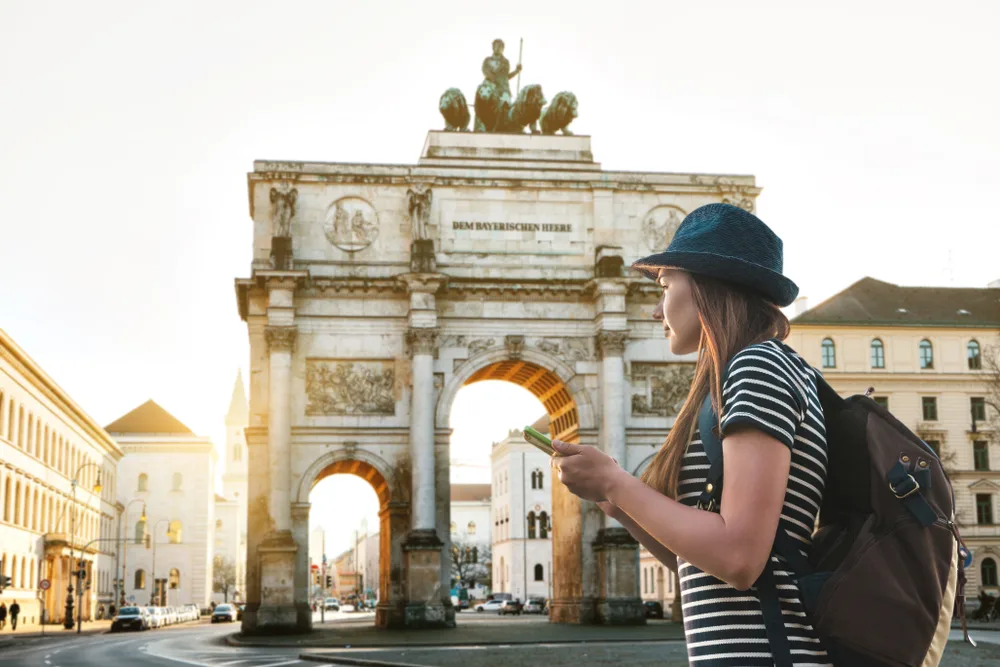
franz12/Shutterstock
Yes, Munich is safe to visit and one of Germany’s safest big cities. Although crime is present in the city, such as pickpocketing or mugging, the crime rate is relatively low.
As long as you take basic precautions, you should have a safe visit to the city. In fact, according to some metrics, Munich is one of the safest cities in the world! It routinely ranks highly on lists of the safest cities to visit and live in.
According to CEOWORLD magazine, it’s the fifth safest (big) city in the world and the safest city in Europe. Global surveys conducted by magazines or websites tend to rank Munich highly in terms of safety.
Munich is located in Germany and tends to experience the same problems that other places in Germany can experience. It is Germany’s third-largest city, so it is hard to escape the problems both inherent to Germany and to big cities.
Germany has a reputation for being a safe country to visit. However, many countries such as the United States advise their citizens to exercise increased caution in Germany, primarily due to the threat of terrorism.
Common problems that occur in Germany and are therefore likely in Munich as well are:
- Pickpocketing
- Bag snatching
- Robbery
- Mugging
- Targeted hate crimes
- Demonstrations
- Terrorism
While civil unrest is not as much a concern in Germany as it is in France, protests and strikes do occur. Since Munich is one of the biggest cities and a regional hub, you can expect nation-wide protests to also happen there.
For example, anti-war activists gathered in the city in February 2023. Most protests tend to be tied to national politics, such as a strike, or major events such as international conferences hosted in Munich.
Although most protests are peaceful, the situation can change at any moment. You also don’t want to get caught up in a crowd when you don’t know enough about the local political context to understand what you are protesting for.
Follow the news and if a protest is announced, adjust your travel plans accordingly.
One sad but important caveat to note is that Munich is not equally safe for all visitors. The far-right presence in Munich is increasing, and members of far-right groups sometimes hold marches in Munich.
There has been an increase in Germany in targeted hate crimes, often at religious and racial minorities, and sadly that happens in Munich as well.
If you are an LGBT, Muslim, Jewish, or POC traveler, you should be aware of the possibility of this happening during a visit. However, discriminatory incidents are not that widespread in the city, and the rate is still fairly low.
Many people are welcoming to visitors of all kinds, and the city is not just far right rallies — thousands of people rallied against the far right. Overall, Munich is a safe place to visit, especially if you use basic precautions to keep yourself safe.
Crime in Munich
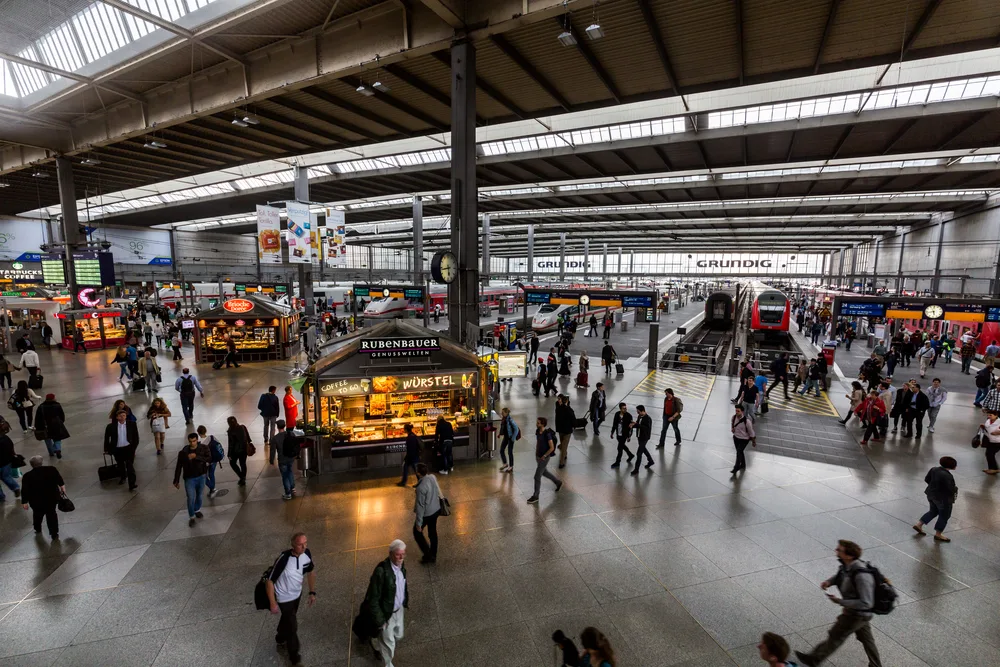
MUNICH, GERMANY – JUNE 22, 2016: Interior view of the Munich main railway station (Munchen Hauptbahnhof) on June 22, 2016. It is one of the three long distance stations in Munich./Oscity/Shutterstock
One of the reasons why Munich is so safe is that the crime rate is fairly low. For such a big city, it has a surprisingly low crime rate. Visitors and locals alike generally feel safe in the city.
According to Numbeo, Munich scores a 20.79 out of 100 on the crime index, which is a very low score. The crime index score remains low or very low, even when broken down by type of crime.
The most common crimes people worry about are petty crimes or property crimes, such as verbal insults, drug abuse, vandalism, and theft. Although people report concerns about crime increasing over the past few years, the crime rate remains low.
The violent crime rate is also very low. The gun death rate is just 1.01 incidents per 100,000 people annually. When homicide rates are low, that usually means that the rates of other violent crimes are low as well.
There are a few reasons why Munich is so safe. The city is fairly wealthy and has lower rates of poverty and unemployment than other parts of Germany. These are social factors that often contribute to crime, so eliminating them means Munich also lowered its crime rates.
Munich is located in Bavaria, a southern German state that considers itself a bit separate from the rest of the country. It has good reason to be, as Bavaria is much safer than the rest of Germany.
There are a few reasons why Bavaria is so safe, including its incredible prosperity (even by German standards), high levels of investment in law enforcement, and close-knit culture where everyone feels responsible for maintaining a safe city.
Munich has some crime, just like any city, but the crime rate overall is very low.
Petty Theft
The most common crime in Munich, like in most European cities and popular tourist destinations, is petty theft. Common forms of petty theft include pickpocketing, bag snatching, and tourist scams.
Although the rate of petty theft is much lower here than in other parts of the world, including other parts of Germany, it is still worth staying on alert. Pickpockets tend to operate in crowded places, especially those that attract a lot of tourists.
Be wary when using public transportation such as the S-Bahn. Thieves operate on the platforms and trains.
Sometimes, groups will stand near the train doors so people getting on and off are forced to squeeze by, making them vulnerable to theft. The main train station is also a hotspot for theft.
Popular tourist attractions are also common hotspots for theft. Petty theft increases during times when there are more tourists in Munich, such as Christmas, when the Christmas markets pop up. Thieves operate in the crowded markets and narrow alleyways between the stalls.
Oktoberfest sees the biggest increase in crime as millions of visitors (and some thieves) descend on the city.
Keep a close grip on your valuables during Oktoberfest. Although the hedonistic atmosphere is intoxicating, make sure that you keep some awareness around you so you don’t make yourself vulnerable to theft.
The Canadian government includes advice about petty theft in its travel advisory for Germany that is relevant for Munich specifically as well.
The best way to prevent pickpocketing and other forms of theft is to keep your valuables in a secure place where they are hard to snatch without you noticing. Make sure you don’t put your wallet in your back pocket or in an outside pocket of your backpack or bag.
Terrorism
Most travel advisories for Germany mention the possibility of terrorism in their warnings. The German Federal Ministry of the Interior admits that terrorism is a concern in the country on its official website.
Most terrorist attacks are motivated either by radical Islamism or far-right ideology. The latter camp, which often includes targeted attacks on people of foreign descent, is growing fast.
Munich experienced a recent major terrorist attack. In 2016, a terrorist opened fire in a Munich shopping mall, killing 9 people and injuring 30. He was motivated by fascist ideas and specifically targeted racial minorities.
It was the deadliest terrorist attack in Munich in decades. Munich has also experienced terrorist threats that were foiled by authorities.
New Year’s celebrations in 2016 were cut short by a suicide bomb threat in the central train station. It is clear that there is a risk of terrorism. However, you’ll notice that there haven’t been major attacks since 2016.
Local and German authorities have stepped up counter-terrorism and law enforcement efforts, often foiling terrorist plots before they even get close to fruition.
You can take some precautions to minimize your risks of terrorist attacks, such as staying alert in crowded areas and always having an exit plan in mind. However, terrorist attacks are random, and you can’t protect or avoid them completely.
While it’s good to be aware of the risk, you don’t want to let your fear over something completely out of your control stop you from traveling freely. Although terrorist attacks can happen, the risk is fairly low.
Avoiding Bad Areas
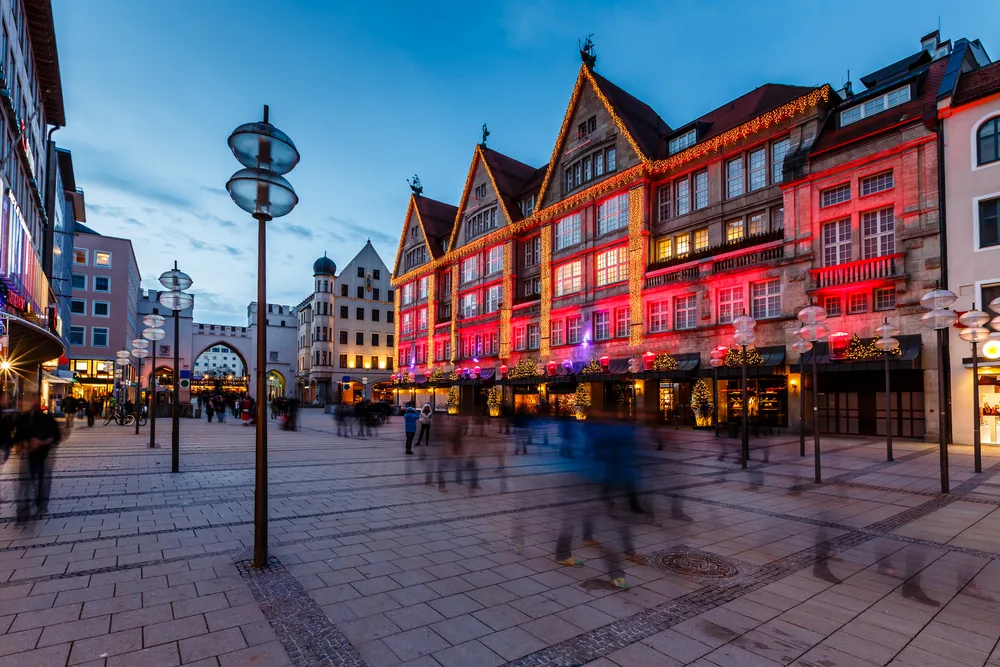
ansharphoto/Shutterstock
Munich has a few sketchy areas, but they tend to be located outside of the center. Most locals advise avoiding Hasenbergl and Neuperlach Sud, which have higher crime rates than other parts of the city.
However, there is not much to see in either area, so you can avoid it during your trip. The area around the train station is also a bit sketchy. The area south of the train station, called Hauptbahnhof, is the city’s red light district.
Although it is safe by the standards of international red light districts, it is a bit sketchy at night. You should also avoid walking through parks at night, especially if you are a woman traveling alone.
Things to Consider
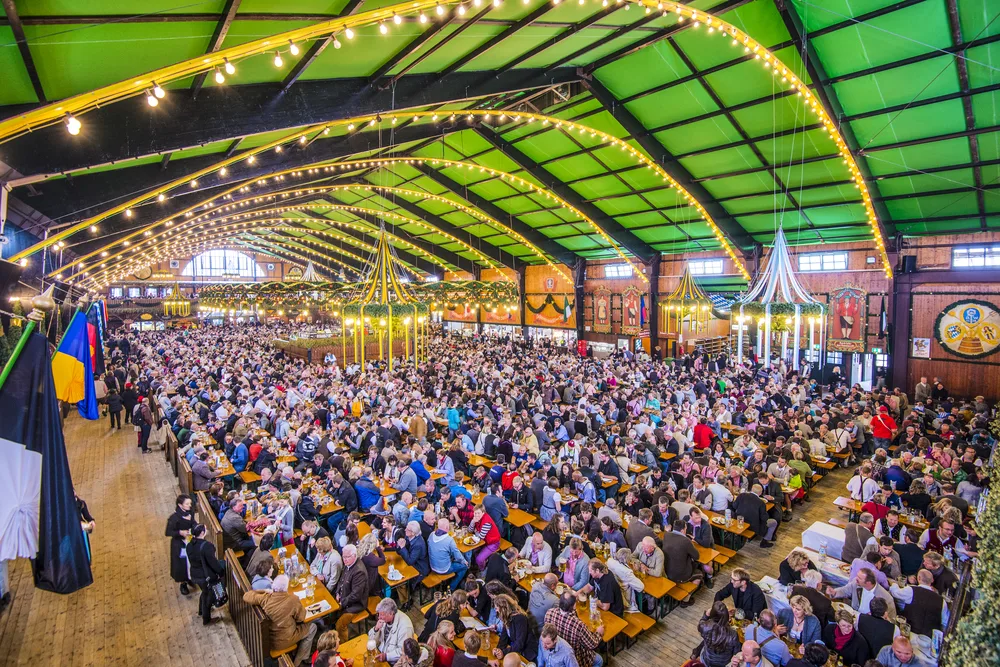
MUNICH – SEPTEMBER 30: Beer Tent on the Theresienwiese Oktoberfest fair grounds September 30, 2013 in Munich, Germany./Sean Pavone/Shutterstock
Here are a few things to consider before visiting Munich:
- Follow local laws. Fines for minor offenses such as jaywalking or not buying a ticket for public transportation can be hefty, and police officers are not usually interested in explanations. Germans are famous for their law-abiding public culture, and you should follow the lead of locals.
- Be careful around Oktoberfest. Although Oktoberfest is fun, it is also the time when crime increases the most in Munich. Not only do thieves prey on drunk people attending the festival, but the high amounts of alcohol also consumed lead to reckless behavior. Rates of catcalling and bar fights increase. If you notice someone acting belligerent, avoid them or contact a bouncer.
- Stay out of the bike lanes. Munich cyclists tend to be fast and don’t tolerate many slow-downs. Prepare for angry bell ringing and shouts.
Frequently Asked Questions
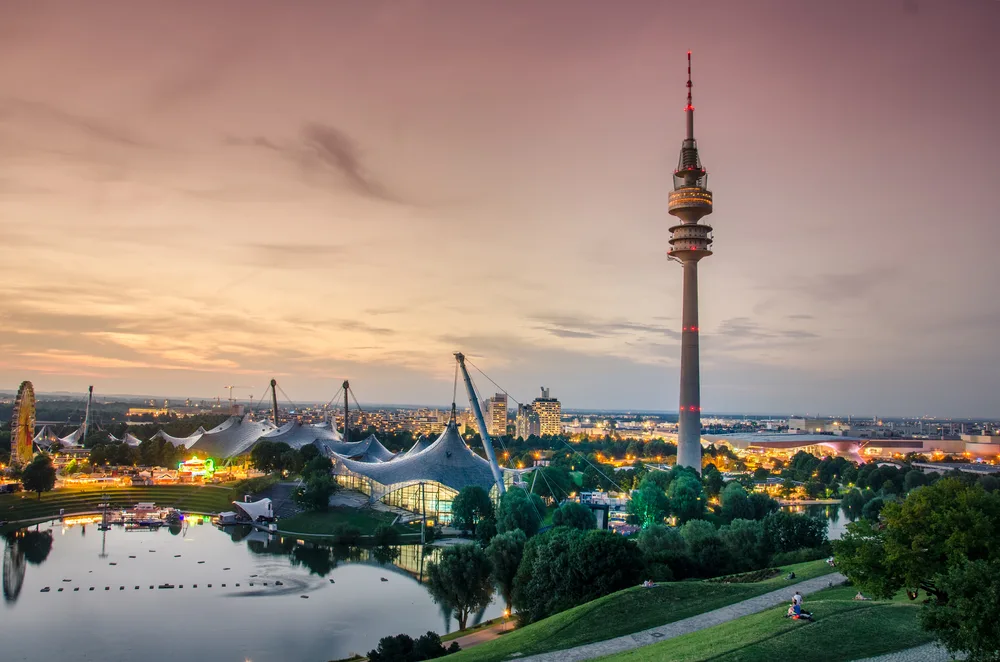
Phillus/Shutterstock
Here are a few questions people tend to ask when in Munich:
Is it safe to walk in Munich at night?
Munich is so safe you can even walk around at night. You should just avoid sketchy areas such as the neighborhood around the train station or poorly lit parks.
Is Munich safe in 2023?
Munich is safe all the time, including now in 2023. The crime rate is very low and the risks of other incidents, while present, are also low.
Is Munich safe for solo females?
Munich is also safe for solo female travelers. Women traveling alone should just take a few more precautions when walking around at night or when going to places notorious for rowdy drunk crowds, such as Oktoberfest.
Can I speak English in Munich?
You can speak English and since most people speak English as a second language, you’ll likely find someone to speak it with. However, it’s a good idea to learn some German phrases to fit in.
Are taxis safe in Munich?
Taxis are safe in Munich because the local government heavily regulates them. If you think a driver scammed you, the police will help you if you call them and share the license plate number.
So, Is Munich Safe to Visit?
Munich is one of the safest cities to visit in Germany and in Europe as a whole! It has a low crime rate and a secure atmosphere thanks to the prosperous economy and high levels of law enforcement.
So, with so much to see and do, what are you waiting for — book your trip today and experience for yourself all that Munich has to offer. Happy travels!



